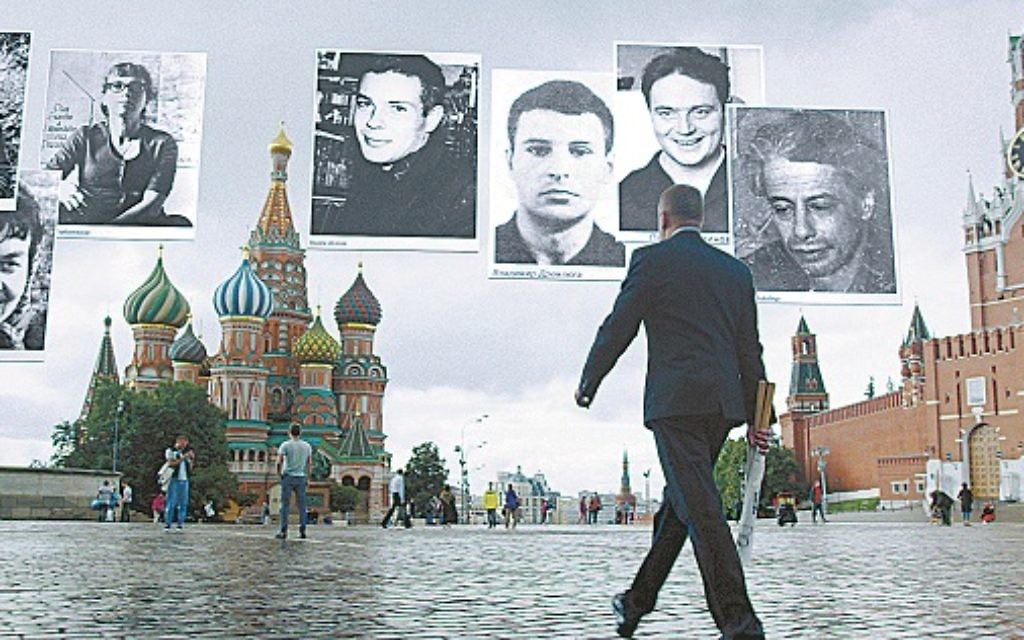AJFF Review: ‘Russian Jews’ Vividly Retells History
Broken into three feature-length films, the documentary covers the individuals and the bigger picture.
The story of the Jews who at some point answered to the Russian czars or the Soviet commissars is the history of most of today’s Ashkenazi Jews, so plenty of people should be interested in the epic documentary “Russian Jews.”
They won’t be disappointed by this sweeping, creative approach to its subjects and their effects on Russia and the world — at least until the death of the Soviet Union in 1991.
“Russian Jews” is broken into three parts, each being shown two times at the Atlanta Jewish Film Festival: through the Russian Revolution; 1918 to 1948; and after 1948. While they use the same techniques to enliven history — most notably the world travels of excited and exciting narrator Leonid Parfenov and the animation of photographs so that, for example, Catherine the Great speaks to us — the stories become more focused and personal as time advances.
Get The AJT Newsletter by email and never miss our top stories Free Sign Up
Part 1 largely presents generalities about the Jewish people, most of whom toiled in anonymity within the Pale of Settlement until the 19th century, when opportunities developed after reforms under Alexander I. But it’s not just a tale of Tevyehs and pogroms (a word you’ll wait 36 minutes to hear).
You’ll find repeated insights into Jewish life in the Russian Empire, none more important than the fact that Jews, like other nationalities, were swept into the czarist expansion: “And so the Jews did not come to Russia, but Russia came to the Jews.”
The film shows a growing Jewish impact on the arts, then an outsize role in the revolution, although the Jews involved with the Bolsheviks and even more radical groups often came from affluent families with little connection to their Judaism. We’re told that five of the nine people at the first congress in 1898 of what became the Communist Party were Jewish, as were 17 of the 30 people on the train Lenin rode into Russia in 1917.
With Jews officially equal to everyone else in the Soviet Union, Part 2 tells the tale of the people through the stories of individuals, from politicians such as Trotzky to artists such as Chagall, and delves into the heavily Jewish world of Odessa, which Parfenov demonstrates is locally pronounced “Adesa.”
That lesson in dialect is an example of some of the humor I fear we non-Russian speakers miss while reading the subtitles. Another comes in the aftermath of the assassination of the White Russian leader in exile in Paris. The subtitles say the police detectives were outsmarted by a graduate of a Minsk technical school, but you can hear Parfenov mock those sleuths with a reference to Agatha Christie hero Hercule Poirot.
In Part 2, we learn that every non-Jewish leader in the Soviet Union’s early days had a Jewish wife and that the Soviets were first to deploy Jews as global intelligence assets. We also see how Stalin gradually, violently purged Jews from the government — until he went to war against Hitler. Judeophilia and the propaganda work of the Jewish Antifascist Committee became tools of the state until 1945.
Part 3, the weakest of the three, shows how that Judeophilia flipped to official Judeophobia as soon as the war ended, although “Russian Jews” says the Soviet Union was the first nation to recognize Israel, in part because of the hope that a nation of kibbutzim led by socialists with Russian roots would align with the Soviet Union.
But Israel’s rebirth also inspired a new longing in the increasingly oppressed Jews, many of whom “Russian Jews” says would have been happy to remain good Russians if they had only been given the chance. For example, three great Jewish writers — Osip Mandelstam, Boris Pasternak and Joseph Brodsky — were persecuted for trying to be Russian poets when the state required them to be Soviet ones instead.
The film thus casts the refuseniks as part of the broader Jewish involvement in the Soviet civil rights movement and tracks Jewish emigration’s role in U.S.-Soviet relations.
After more than 5½ hours of details and insights, however, the end of “Russian Jews” feels abrupt, racing through the final decade of the Soviet Union and not pausing to address the millions of Jews who in the end poured out to settle in Israel and the United States.
The film’s faux happily-ever-after conclusion perhaps tells its own story of life in Putin’s Russia.
(Atlanta Jewish Film Festival screenings: Feb. 6, 8 p.m., and Feb. 7, 2:15 p.m., for Part 1; Feb. 7, 7 p.m., and Feb. 8, 3:10 p.m., for Part 2; and Feb. 8, 7:50 p.m., and Feb. 9, 11:55 a.m., for Part 3, all at Springs Cinema)





comments